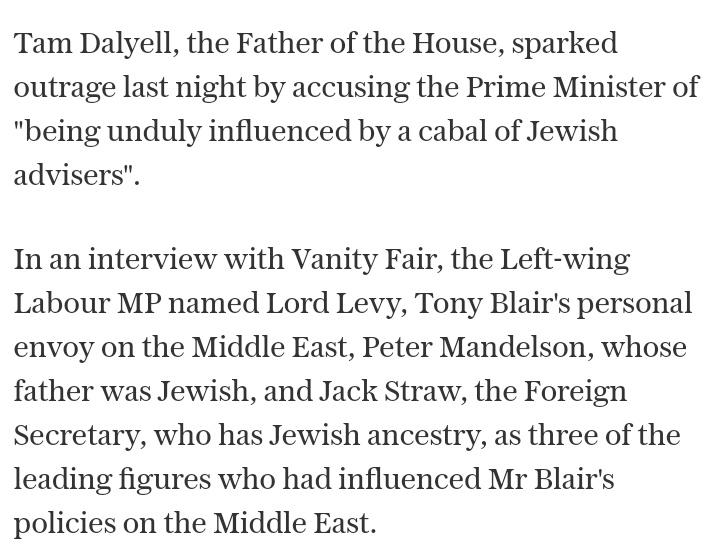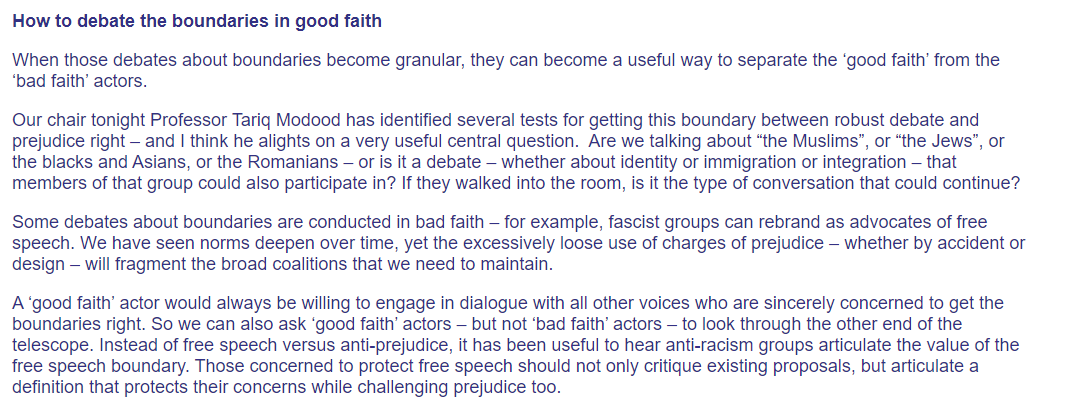Newsnight included Len McCluskey dismissing Peter Mandelson& #39;s views, on the grounds he & #39;should go into a room and count his gold& #39;. Newsnight read out a Unite statement saying this couldn& #39;t be an anti-semitic trope as, to the best of their knowledge, Mandelson isn& #39;t Jewish.
Mandelson is the grandson of Herbert Morrison. His father was Tony Morrison, advertising director of the Jewish Chronicle, and an atheist of Jewish heritage. Mandelson spoke about his family background in this JC interview when his memoirs came out. https://www.thejc.com/lifestyle/features/mandelson-on-judaism-lord-levy-and-his-jc-dad-1.16937">https://www.thejc.com/lifestyle...
Mandelson said in 2003 "Apart from the fact that I am not actually Jewish, I wear my father& #39;s parentage with pride" after Tam Dalyell said he was part of "a cabal of Jewish advisers". (Its possible to be anti-semitic vs those who are not actually Jewish)
https://www.telegraph.co.uk/news/uknews/1429114/Fury-as-Dalyell-attacks-Blairs-Jewish-cabal.html">https://www.telegraph.co.uk/news/ukne...
https://www.telegraph.co.uk/news/uknews/1429114/Fury-as-Dalyell-attacks-Blairs-Jewish-cabal.html">https://www.telegraph.co.uk/news/ukne...
Statement in defence is poor.
Maybe possible to use an anti-semitic trope, having forgotten someone has Jewish heritage, but response should be to apologise, not defend.
& #39;Go into a room & count his gold& #39; is rather different to eg & #39;he& #39;ll be swanning off to Davos& #39; etc
Maybe possible to use an anti-semitic trope, having forgotten someone has Jewish heritage, but response should be to apologise, not defend.
& #39;Go into a room & count his gold& #39; is rather different to eg & #39;he& #39;ll be swanning off to Davos& #39; etc
Len McCluskey followed up with this tweet apologising for his use of language, at half past midnight, & #39;before things get out of hand& #39; https://twitter.com/LenMcCluskey/status/1318333720915476487?s=19">https://twitter.com/LenMcClus...
If people want to attack their political opponents - (eg & #39;I& #39;ve long felt he stands for the have yachts Davos set, not the have nots on the factory floor& #39;, etc) - doing so *without* using anti-semitic tropes is a good way to avoid being challenged for using anti-semitic tropes.
Underlying rule on prejudice boundaries:
It is not anti-semitic to make political (or indeed populist) challenges to political or financial elites [from whatever background] *as long as* you don& #39;t use anti-semitic language, imagery or tropes in making such political challenges.
It is not anti-semitic to make political (or indeed populist) challenges to political or financial elites [from whatever background] *as long as* you don& #39;t use anti-semitic language, imagery or tropes in making such political challenges.
This is a useful way to delineate many prejudice boundaries, re what& #39;s permitted & isn& #39;t.
"It is not anti-semitic to criticise the policy of the government of Israel - as long as you don& #39;t use anti-semitic language/imagery, or hold all Jews responsible for Israeli policy"
"It is not anti-semitic to criticise the policy of the government of Israel - as long as you don& #39;t use anti-semitic language/imagery, or hold all Jews responsible for Israeli policy"
"It is not racist to talk about immigration (or to want immigration to be reduced) - as long as you aren& #39;t making racist arguments about immigration when you talk about it"
Despite an element of tautology - its not racist, as long as you aren& #39;t racist - this approach actually opens up a useful discussion about what needs to lie on both sides of that boundary and why, if you have people with differing views who do agree there is/should be a boundary
The value of setting out what must be permitted - before drawing the line against prejudice - is perhaps rather under-estimated by those seeking to protect boundaries against prejudice and hate speech.
Attempting to have this boundaries conversation is also an effective practical way to differentiate good faith from bad faith actors in debates about free expression, prejudice and hate speech.
http://www.britishfuture.org/articles/tackle-prejudice-polarised-times/">https://www.britishfuture.org/articles/...
http://www.britishfuture.org/articles/tackle-prejudice-polarised-times/">https://www.britishfuture.org/articles/...
Any political party interested in strengthening anti-prejudice norms would have an education and training programme rolled out across office-holders and members. Discussing question of boundaries, being aware of what crosses them, could usefully be of central, practical utility.
4 big reasons to use this framing on boundaries.
- Avoids arid stand-off/misunderstanding (so we can& #39;t even criticise Mandelson now)
- Gets to core issues
- Recognises free speech reputation & content of anti-hate campaigners matters (& is in question)
- So can broaden coalition
- Avoids arid stand-off/misunderstanding (so we can& #39;t even criticise Mandelson now)
- Gets to core issues
- Recognises free speech reputation & content of anti-hate campaigners matters (& is in question)
- So can broaden coalition

 Read on Twitter
Read on Twitter







